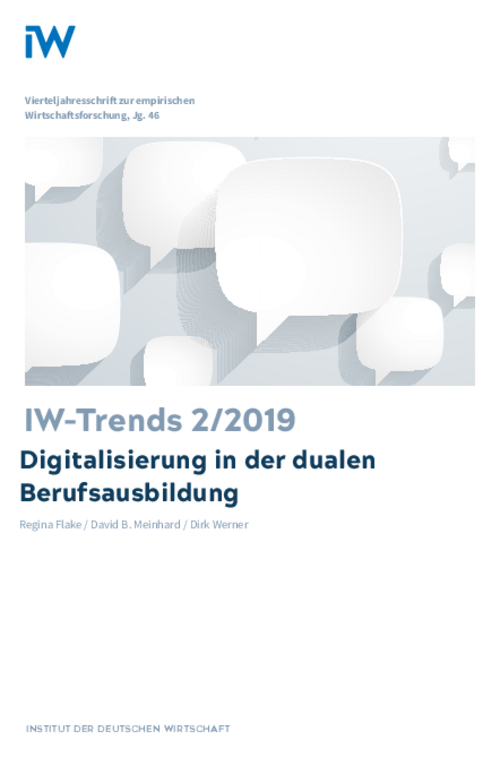This paper analyses the impact of the digital transformation on training activities in German enterprises.

Digitalisation in Dual Vocational Training: Progress to Date and Companies’ Ongoing Need for Modernisation and Support
IW-Trends

This paper analyses the impact of the digital transformation on training activities in German enterprises.
It examines which measures companies are already implementing, where they need to change and where they need support – be it with internal processes, external courses, the framework conditions provided by education policy or the vocational schools, the firms’ partners in Germany’s dual training system.
What is clear is that digitalisation must be integrated even more closely into training courses. Of the businesses providing vocational training nearly a third, most of them small, have not yet addressed the issue of digitalisation in their training. Where they are most frequently active is in exploiting the ideas and suggestions of their trainees, the further training of their own trainers and in adjusting the content of their training courses. Companies’ overall degree of satisfaction with vocational schools is quite sobering, the item most positively rated being the willingness of vocational school teachers to cooperate with in-house trainers. Firms are currently expressing a primary need for support in creating additional and elective qualifications for trainees in order to better exploit the potential of digitalisation in vocational training.

Regina Flake / David B. Meinhard / Dirk Werner: Digitalisierung in der dualen Berufsausbildung – Umsetzungsstand, Modernisierungs- und Unterstützungsbedarf in Betrieben
IW-Trends

More on the topic

Data Utilisation and Data Sharing: The Potential and the Reality in German Companies
Companies that store their data extensively in digital form, process it in a structured manner and use it in a variety of ways can become particularly efficient members of the data economy.
IW
Intellectual property and fourth industrial revolution technologies: how the patent system is shaping the future in the data-driven economy
Using the classification system from the European Patent Office (EPO), we identify almost 600,000 patent applications for fourth industrial revolution technologies from 1986 to 2015.
IW